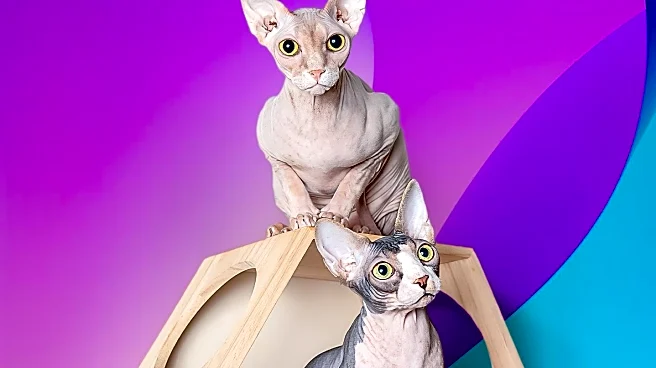What's Happening?
A kitten born in Brazil with a rare condition has captured the attention of the internet due to its unique appearance. Dubbed the 'Cyclops Cat,' this feline has one large eye positioned in the center of its head,
a condition that is extremely rare and often associated with genetic mutations. The story of this unusual cat has been featured on the 'Weird But True' segment, highlighting its rise to fame despite its peculiar look. The host, Andrew Court, delves into the details of this extraordinary animal, which has sparked curiosity and fascination among viewers worldwide.
Why It's Important?
The Cyclops Cat's story underscores the power of social media and online platforms in bringing attention to unique and rare occurrences. This phenomenon highlights how unusual stories can quickly gain traction and captivate audiences, leading to widespread discussion and interest. The attention garnered by the Cyclops Cat also raises awareness about genetic mutations and their impact on animals, potentially encouraging further research and understanding of such conditions. Additionally, it reflects society's fascination with the unusual and the role of media in shaping public perception and interest.
What's Next?
As the Cyclops Cat continues to gain popularity, it may lead to increased interest in genetic research and animal welfare. Scientists and researchers might explore the genetic factors contributing to such mutations, aiming to understand their causes and implications better. Animal welfare organizations could also leverage this interest to promote awareness about the care and treatment of animals with special needs. Furthermore, the story may inspire similar segments or features, focusing on unique and rare animal conditions, thereby expanding public knowledge and interest in animal genetics.
Beyond the Headlines
The Cyclops Cat's story touches on ethical considerations regarding the portrayal of animals with genetic mutations. It raises questions about the balance between entertainment and sensitivity towards animals with special needs. The fascination with such stories can lead to increased awareness and empathy, but it also necessitates responsible reporting and portrayal to avoid sensationalism. This development may prompt discussions on how media can responsibly cover stories involving animals with unique conditions, ensuring that the focus remains on education and awareness rather than mere entertainment.










